Looking for long-lasting caravan batteries? Lithium batteries are the way to go! With the ability to last 2000-3500 cycles, they outshine traditional lead-acid batteries eight to nine times over. Trust us, your adventures will never be cut short with lithium power.
Rev up your mobile adventures with lithium caravan batteries! These sleek and durable powerhouses are the must-have accessory for modern-day caravanning. Not only are they super-easy to install, but they’re also lightweight and compact, so you can pack them alongside your other essentials. From charging your devices to running appliances, these batteries are engineered for optimal efficiency and long-lasting power, ensuring you enjoy home-like comfort throughout your trip. So, whether you’re a seasoned traveler or just embarking on your first road trip, a lithium caravan battery is the way to go!
Table of Contents
Lithium Batteries for Caravans – An Overview
Definition of lithium caravan batteries
Lithium caravan batteries are rechargeable batteries specifically designed for use in caravans and other recreational vehicles. These batteries use lithium-ion technology, which offers several advantages over traditional lead-acid batteries, including higher energy density, longer lifespan, and faster charging times. Lithium caravan batteries are typically lightweight, compact, and easy to install, making them an attractive option for caravan owners who want a reliable and efficient source of power for their appliances and devices.
Advantages of lithium batteries over other types of batteries
Power up with lithium batteries – the ultimate choice for energy efficiency and reliability. Whether you’re powering a small device or a large appliance, lithium batteries offer undeniable advantages that simply can’t be matched by other types of batteries. With longer battery life, increased durability, and enhanced safety features, it’s no wonder why lithium batteries are the clear winner in the battery game. So why settle for anything less? Choose lithium, and experience the power you deserve.
Types of lithium batteries available for caravans
Electrify your caravan adventures with the power of lithium batteries! With various types available, you can find the perfect fit for your needs. The popular Lithium Iron Phosphate (LiFePO4) battery boasts high energy density, a long lifespan, and exceptional safety at an affordable cost. For those seeking high power output and fast charging capabilities, check out the Lithium Manganese Oxide (LiMn2O4) battery. And for the ultimate energy density, the Lithium Nickel Manganese Cobalt Oxide (LiNiMnCoO2) battery, also known as NMC, delivers unparalleled power (but with a higher price tag and complex battery management). So why settle for traditional batteries when you can rev up your caravan with lithium’s cutting-edge technology?
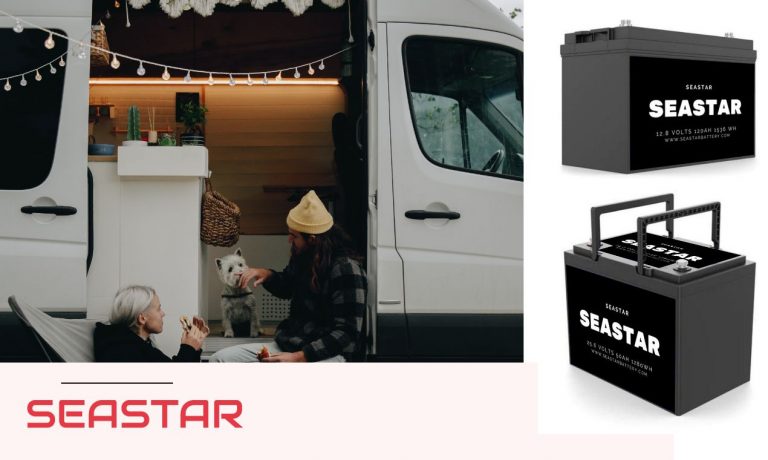
Choosing The Right Battery For Your RV/Caravans
“What is the best battery for my RV?”
Choosing the best battery for your RV depends on several key factors, especially when you’re sourcing products for different markets:
Frequency of Boondocking/Dry Camping: How often will your customers be camping without access to electrical hookups? This will impact the type of battery that offers the best performance for off-grid adventures.
Power Demand: Consider how many 12-volt components the RV will be running and for how long. Higher power demands require batteries with greater capacity and endurance.
Duration of Stay: How long do your customers plan to stay off-grid before needing to recharge? This factor is crucial in determining whether they need a deep-cycle battery that can provide sustained power over extended periods.
Budget: Different customers have different budget constraints, so offering a range of battery options—from cost-effective choices to premium solutions—ensures you can meet a variety of market demands.
Battery manufacturers typically produce a range of products tailored to specific applications. As an international buyer or importer, it’s essential to understand these variations to select the right battery types for your market. Let’s start by exploring the different categories of batteries, such as cold cranking amps (CCA) for engine starting and deep cycle batteries for prolonged power usage.
Benefits of Trojan RV Batteries
Trojan batteries are a well-respected choice for RV owners and offer several key advantages that make them stand out in the market:
Proven Reliability: With decades of experience in the battery industry, Trojan batteries have earned a reputation for dependable performance. This reliability is crucial for RV owners who rely on consistent power during their travels, especially in off-grid situations.
Deep Cycle Technology: Trojan RV batteries are specifically designed for deep cycle use, providing long-lasting power over extended periods. This makes them ideal for running multiple appliances and electronics in an RV, ensuring a smooth and uninterrupted camping experience.
Durability: Built to withstand harsh environments, Trojan batteries feature robust construction that resists damage from vibrations, extreme temperatures, and rough terrain—conditions commonly encountered by RV enthusiasts.
Long Lifespan: Trojan batteries are engineered for long service life, which reduces the frequency of replacements and provides better overall value. Their ability to withstand repeated charging and discharging cycles ensures that RV owners get more out of their investments.
Low Maintenance Options: Trojan offers a range of low-maintenance and maintenance-free batteries, such as AGM (Absorbed Glass Mat) and gel batteries, which require less upkeep compared to traditional flooded lead-acid batteries. This convenience is a significant benefit for RV owners looking for hassle-free power solutions.
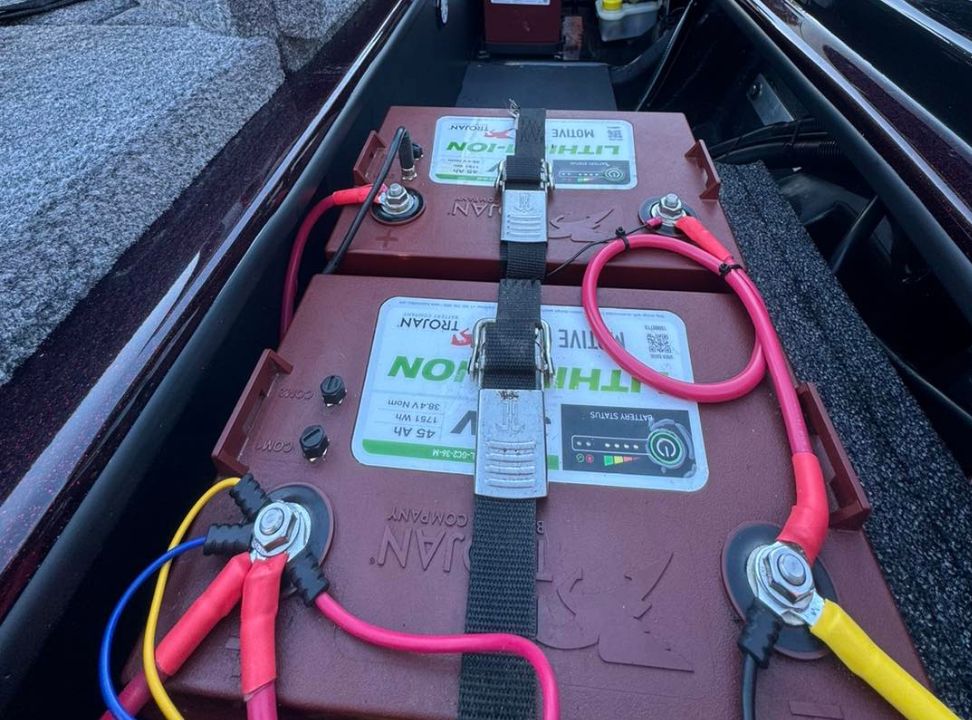
Trojan 12V AGM RV Batteries
Lasts Longer: Delivers up to 3x longer cycle life than standard AGM. Validated at 1,200 cycles at 100% DoD vs. 400 cycles for AGM.
Performs in harsh conditions: Robust performance in extreme temps and conditions, with a temperature range from -40°F to 160°F (-40°C to 71°C).
Delivers harmless PSoC: Tested to withstand partial state of charge, or PSoc, again and again.
Maintenance Free: Virtually no maintenance as watering is not required.
Safe and Sustainable: Trojan AES AGM is classified as non-spillable and can be safely mounted horizontally to fit your space. These batteries are made using 80% recycled and 99% recyclable.
Rugged Design: Designed and manufactured to absorb vibration and shock.
Warranty: This VRLA absorbent glass mat battery is backed by a 3-year warranty.
AGM Charger: Charge with existing AGM battery charger and profiles.
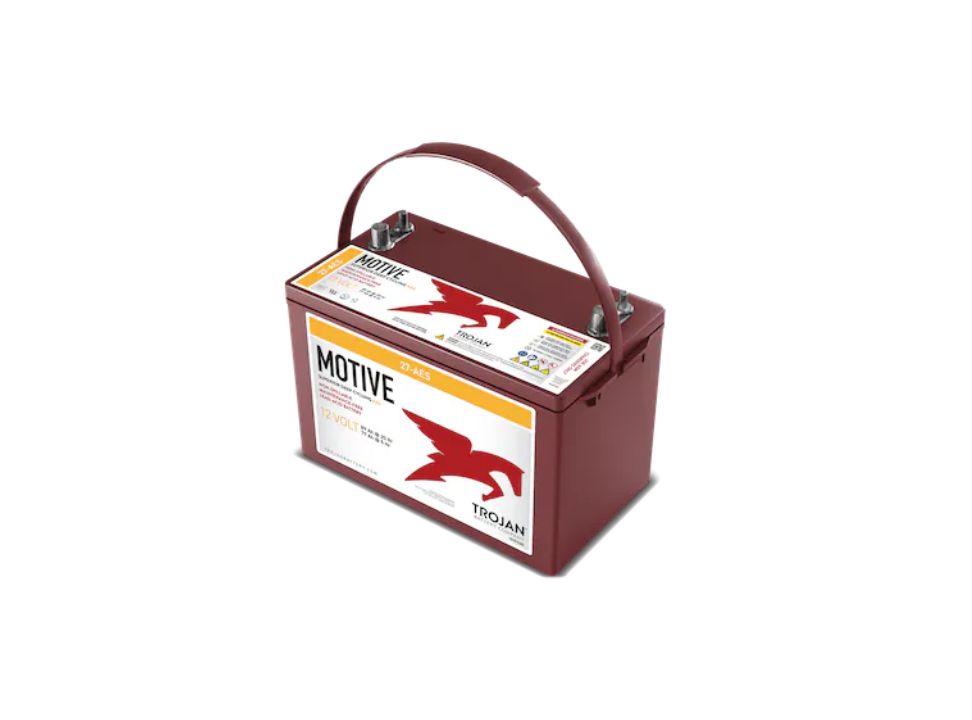
Trojan Flooded Lead Acid Battery
- Part of the Signature Line, the flagship Trojan flooded lead-acid batteries
- Featuring Alpha Plus® paste with T2 Technology for maximum sustained performance, longer life and increased total energy
- Maxguard T2 advanced separator sustains performance providing exceptionally longer battery life and significantly lowering your operating costs.
- Manufactured polypropylene rugged case
- Heat and corrosion resistant
- Only 5-15% self-discharge per month
- 4 different terminal types
- 99% recyclable
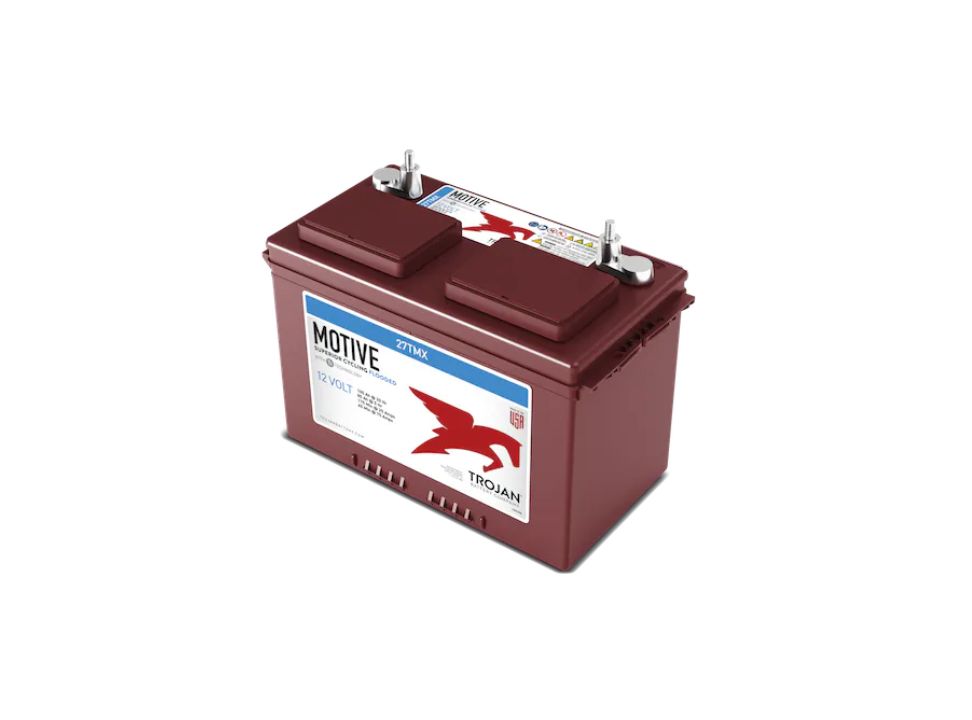
Leadmax Slimline Lithium Battery For RV
The Slimline Configuration Allows For Easy Fitment Behind Seats.
Longer life: Lithium batteries are rated for 2,000 – 5,000 cycles and much more if used carefully, giving you several times the life expectancy of standard lead-acid batteries
Powerful: Lithium batteries allow you to pull far more amps out of the same size battery systems
Light-weight: Lithium batteries are less than half the weight of the equivalent lead-acid battery.
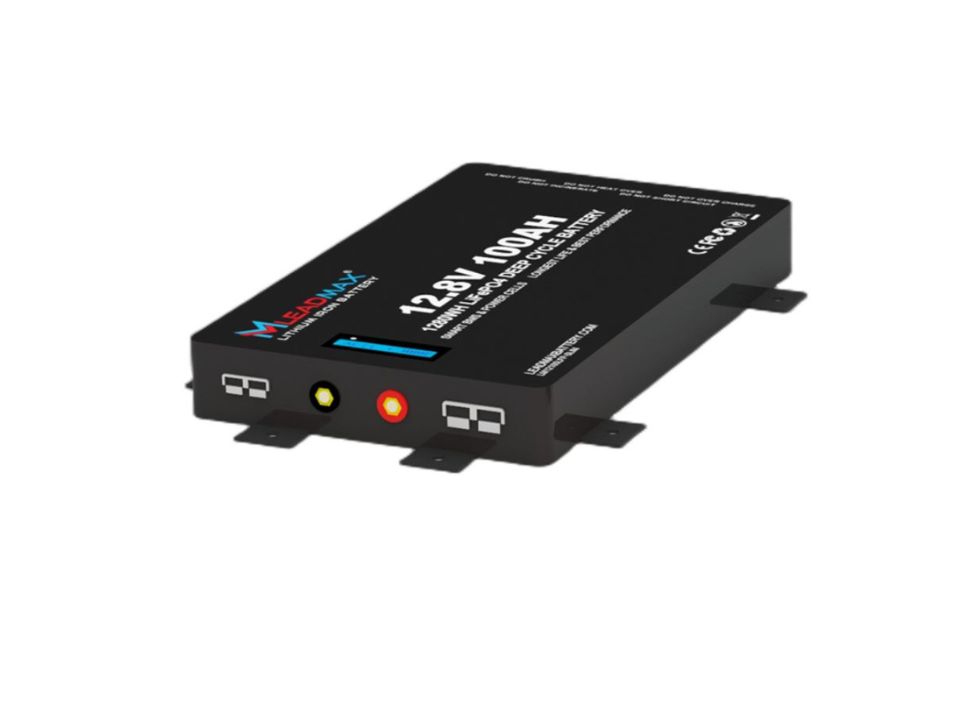
Factors Affecting the Lifespan of Lithium Caravan Batteries
Quality of the battery
The quality of a lithium caravan battery is an important factor to consider when selecting a battery for use in a caravan. High-quality lithium batteries are built with high-grade materials, advanced manufacturing processes, and quality control measures to ensure consistent and reliable performance.
When choosing a lithium battery for a caravan, it is important to consider the reputation and track record of the manufacturer. Look for manufacturers that have a strong reputation for producing high-quality batteries, and that have a proven track record of reliability and performance. Additionally, consider the certifications and standards that the battery meets, such as ISO 9001, CE, and UL certifications. manufacturer. Look for manufacturers that have a strong reputation for producing high-quality batteries, and that have a proven track record of reliability and performance.
Usage patterns
keeping your lithium battery charged at a specific state can significantly impact its lifespan. Lithium batteries are designed to perform optimally when they are maintained between 20% and 80% charged. However, failing to carefully monitor and manage your battery’s charge and discharge cycle can lead to permanent damage and shorter battery life.
Luckily, there’s an easy solution to ensure you get the most out of your battery: a battery management or monitoring system. Whether you’re powering electronic devices or an electric vehicle, investing in a reliable system will keep your battery safe from over-discharging or over-charging so you can keep enjoying its power long-term.
Charging methods
AC Shore Power: AC shore power is the most common charging method for lithium caravan batteries. This method involves connecting the caravan to a standard AC outlet using a shore power cord, which charges the battery through the caravan’s built-in charger. AC shore power is convenient and reliable, but may not be available in all locations.
Solar Power: Solar power is another popular charging method for lithium caravan batteries, especially for those who enjoy off-grid camping. This method involves using solar panels to convert sunlight into electricity, which is then used to charge the battery.
How to Maximize the Lifespan of Lithium Caravan Batteries
Choosing high-quality lithium batteries
Choosing high-quality lithium batteries for your caravan is essential to ensure reliable performance and a long lifespan. Here are some factors to consider when selecting high-quality lithium batteries:
Battery Chemistry: Lithium batteries are available in several different chemistries, including lithium iron phosphate (LiFePO4), lithium cobalt oxide (LiCoO2), and lithium manganese oxide (LiMn2O4). LiFePO4 batteries are generally considered the most reliable and long-lasting, while LiCoO2 batteries are lighter and more compact, but have a shorter lifespan.
Battery Management System (BMS): A high-quality lithium battery should come equipped with a built-in battery management system (BMS) that protects against overcharging, and over-discharging. A good BMS will also balance the cells within the Lithium battery, ensuring consistent performance and a long lifespan.
Capacity and Voltage: Choose a lithium battery with the right capacity and voltage to meet your caravan’s power needs. Higher capacity and voltage batteries will generally provide longer run times but may be heavier and more expensive.
Proper usage and maintenance of lithium batteries
Unlock the Full Potential of Your Lithium Battery with These Expert Tips
Charging, discharging, and storing your lithium battery may seem like a no-brainer, but did you know that there are specific manufacturer’s instructions for optimal performance? Don’t let a lack of knowledge be the cause of a reduced lifespan for your battery.
Birds of a feather flock together, and so do lithium batteries when it comes to damage caused by overcharging and over-discharging. Use a battery management system (BMS) to prevent this, and never fully discharge your battery if you can avoid it. It’s time to take charge of your battery’s health and unlock its full potential.
Common Problems with Lithium Caravan Batteries and Their Solutions
Changing to lithium batteries in a caravan
First, check that your caravan’s electrical system is compatible. Then, consider the battery’s capacity, installation requirements, cost, and maintenance needs. Trust us, the improved performance and convenience are worth it! Just be sure to work with a professional installer or supplier to ensure a smooth transition. With a reliable and efficient battery system, you can focus on enjoying your travels without worrying about power outages.
Can I put lithium batteries in my caravan?
As someone who has researched this question extensively, I can tell you that it is generally possible to put lithium batteries in a caravan. However, it’s important to ensure that your caravan’s electrical system is compatible with lithium batteries and that you choose a battery with the appropriate capacity and specifications for your needs. It may also be necessary to make adjustments to your caravan’s battery box or charging system. I recommend working with a professional installer or supplier to ensure a successful installation and proper use and maintenance of the battery. By taking these steps, you can enjoy the many benefits of lithium batteries in your caravan. supplier to ensure a successful installation and proper use and maintenance of the
Can lithium batteries be mounted under a caravan?
Not only can you easily install these batteries on any RV that accepts house batteries, but they also have the exact same connections as your trusty old lead-acid batteries. And the best part? The LiFePO4 batteries have the same dimensions, so no need to worry about making any drastic changes to your rig’s setup. Upgrade your RV’s power source with the latest and greatest – lithium batteries!
What is the best lithium battery for a caravan?
Finding the perfect lithium battery for your caravan can be quite a challenge. With various factors to consider such as power needs, budget, and personal preferences, it’s important to do your research before making a purchase. Luckily, brands like Seastar and Victron Energy make the decision a little bit easier. These reliable and popular lithium battery brands offer advanced features like built-in battery management systems, deep-cycle capabilities, and compatibility with solar panels and other charging systems
How many lithium batteries for the RV
The number of lithium batteries needed for an RV (recreational vehicle) depends on the size of the RV and the power requirements of its appliances and electronics. In general, one or two lithium batteries with a total capacity of at least 100 amp-hours are sufficient for smaller RVs or camper vans, while larger RVs may require multiple batteries with a capacity of 200 amp-hours or more.
What are the benefits of using lithium batteries for campers?
You already know that reliable energy sources are a must-have. But did you know that lithium batteries are the ultimate solution for powering your outdoor pursuits? Unlike traditional lead-acid batteries, lithium batteries pack a punch with higher energy density, longer lifespans, and faster charging times. Plus, they’re whisper-light on your backpack and virtually maintenance-free. Say goodbye to cumbersome, unreliable power sources and hello to hassle-free adventuring with lithium batteries.
Conclusion:
Choosing high-quality lithium caravan batteries and proper usage and maintenance to maximize their lifespan. taking into account factors such as battery capacity, weight, compatibility, and durability. By choosing high-quality batteries and following proper usage and maintenance guidelines, caravan owners can ensure that their lithium batteries provide reliable and long-lasting power for their travels.